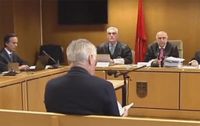Real Madrid coach Carlo Ancelotti has found himself at the center of a high-profile tax fraud trial, with prosecutors seeking a prison sentence of four years and nine months. The case, which unfolded in Madrid, revolves around accusations that Ancelotti failed to declare significant income from image rights during his first tenure at the club from 2013 to 2015.
On April 3, 2025, the prosecution asserted that Ancelotti, 65, had engaged in acts of fraud, concealment, and omission, as he allegedly neglected to report over one million euros ($1.1 million) in taxes owed on earnings from his image rights. The prosecution also alleged that Ancelotti established a "confusing" and "complex" network of shell companies to hide these additional earnings, which included income from real estate.
During his court appearance, Ancelotti vehemently denied any intention to commit fraud. He explained that the financial structure in question was proposed to him by Real Madrid, stating, "When the club suggests it to me, I put Real Madrid in touch with my advisor. I didn’t deal with it because I had never been paid that way. I never realized that something wasn’t right." His lawyer, Carlos Zabala, argued for acquittal, claiming that the Spanish tax authorities were seeking to publicly humiliate the coach.
The trial has drawn attention not only because of Ancelotti's status as a celebrated football manager but also due to Spain's increasing scrutiny of tax evasion among high-profile figures in sports. Similar cases have seen prominent athletes like Lionel Messi and Cristiano Ronaldo face legal consequences for tax-related offenses. Messi and Ronaldo received prison sentences that were waived due to being first-time offenders, while former Real Madrid coach José Mourinho received a one-year suspended sentence after pleading guilty to tax fraud in 2019.
Ancelotti's defense hinges on the assertion that he had no reason to believe his financial arrangements were inappropriate. He noted that at the time, it was common practice among players and coaches to manage income through image rights. "At that time, all the players and coaches were doing it that way; it seemed like the right thing to do," he stated in court.
The prosecution's case is bolstered by the claim that Ancelotti's financial dealings were not transparent. They argue that he only declared his salary from Real Madrid, which was estimated at €6 million per year, and omitted the earnings from his image rights, which the prosecution estimates to be €1.24 million in 2014 and €2.96 million in 2015.
As the trial approaches its conclusion, the Madrid High Court has yet to deliver a verdict that will determine Ancelotti's fate. If found guilty, he could face not only a prison sentence but also a hefty fine. The public prosecutor has demanded a fine of £2.7 million, emphasizing the seriousness of the charges against the coach.
Spain's legal system allows prosecutors to modify charges and penalties based on evidence presented during the trial. This flexibility means that the outcome could still change, depending on how the court interprets the evidence and testimonies. Ancelotti's case has drawn parallels to other recent high-profile tax fraud cases in Spain, including that of Colombian singer Shakira, who agreed to a three-year suspended sentence and paid substantial fines to avoid trial.
As the trial wraps up, Ancelotti's supporters remain hopeful for a favorable outcome. His achievements as a manager, including winning five Champions League trophies and domestic league titles across multiple countries, have solidified his reputation in the football world.
The trial has highlighted the complex relationship between sports and taxation, raising questions about the responsibilities of athletes and coaches regarding their financial arrangements. With the Spanish tax authorities intensifying their crackdown on tax evasion, Ancelotti's case may serve as a pivotal moment in how such matters are handled in the future.
While the trial's proceedings are expected to conclude soon, the implications for Ancelotti and the broader football community are far-reaching. As the world watches, the verdict will not only impact Ancelotti's career but also set a precedent for how tax issues are addressed in the sporting realm.
In summary, Carlo Ancelotti's trial for tax fraud reflects a broader trend of scrutiny facing sports figures in Spain. As the court deliberates, the outcome could have significant consequences for the Real Madrid coach and his legacy.







